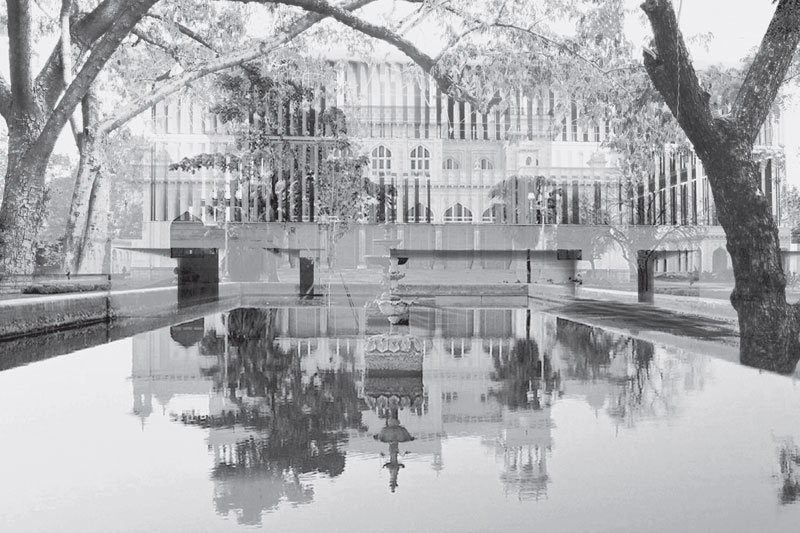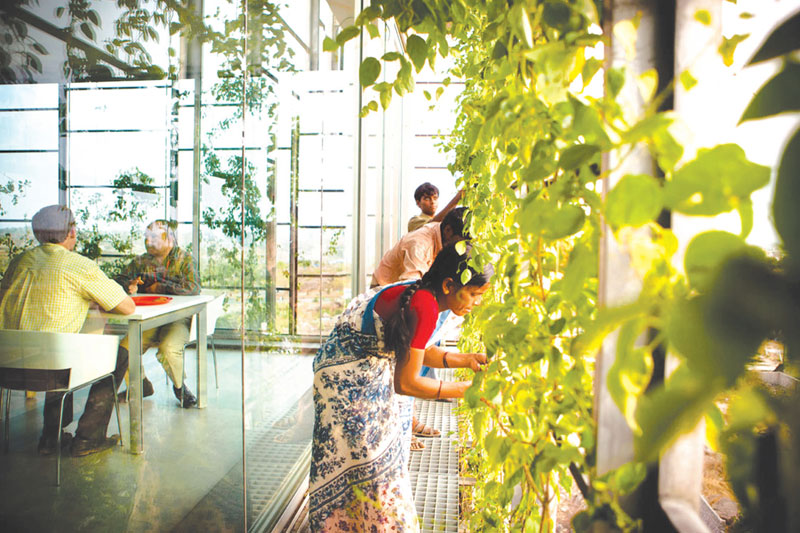Theory and Discourse
From Practice of Indulgence to Practice of Service | In Conversation with Rahul Mehrotra
LA 54 |
|
Rahul Mehrotrais a Professor of Urban Design and Planning at the Harvard Graduate School of Design.
He is a practicing architect, urban designer and educator. He has long been actively involved in civic and urban affairs in Mumbai and was Executive Director of the Urban Design Research Institute in Mumbai from 1994 to 2004.
In an exclusive conversation, he discusses the challenges of changing times in the context of urbanism in India and talks about how designers will have to adopt the roles of advocates of the environment.
|
|
 |
|
In recent years, with growing environmental crises such as urban floods, air pollution, water pollution, traffic congestion, Indian cities arguably come across as crumbling and chaotic models of unorganized growth. Our newly planned cities hardly have any terms of intellectual reference either in nature or culture. Would you agree that our intellectual discourse and engagement with our practices have to some degree failed our times?
Yes, totally failed! I think this happened for a few reasons, the chief one among these being the idea that we have had uneven or incomplete modernization and consequently incomplete urbanization in our recent past. Of course, historically we had an incredibly robust urban culture and amazing cities. But today in India, the way we could describe the state of our cities is one of incomplete urbanization: which can be characterized by the temporal, strong ties with the rural, subject to global economic swings and a condition in which the poor have no access to housing, public health and education.
Furthermore, our intellectual discourse is informed by the theories and narratives that emanated from the industrializing West in the last century. So, the combination of the very particular condition and the application of theoretical and intellectual frameworks that don't recognize this disjuncture have created immensely 'wicked' problems that we are dealing with today. Furthermore, emanating from this disjuncture and the embracing of the narratives from the West, which have been increasingly architecture and built form focused, has exacerbated the problems. Where architecture and the conditions for its successful manifestation have become the single narrative by which we represent the city and privilege it as the single and most important spectacle of the city. Our condition on the planet-the issues you have described in the opening of your question-has shown us how wrong we were in imagining settlement form through just architecture. Fortunately the new emergent narratives that are privileging a more ecological thinking of the human habitat where domains such as water, energy, food, economy, lifestyle, mobility and cultural production are seen as being equally important in creating a robust ecology for us to survive as human beings. The profession of landscape can play a critical role in this equation in making the shift in the narrative about cities in ways that thinking about settlement can be a balance between the landscape in its broadest sense and the production of built form.
What are the tools of practice that an urban planner or designer may think of adopting while addressing the challenges of India with its overwhelming multicultural society, pluralism and wide social and economic disparity-all placed in context of a democracy?
I think to address any landscape of pluralism our narratives have to accept the simultaneous validity of difference. Once we can get over that threshold, then the design question becomes how these co-existences can be spatially imagined. Again, here we have to look at the 'commons' as a way to make these new landscapes. Commons that are related to our material as well as spiritual and cultural well-being. So, besides the fundamental need for energy, food and water, spaces of other forms of co-habitation, the nature of public space and the issue of public resources must be rigorously addressed. In addition, I think designers will have to nuance their roles much more substantially in India as advocates for the environment and for the built and natural habitat more broadly. We tend to reside too comfortably in our silos of disciplines and this will no longer be effective or good for the society. In the coming decades this will have to change if the professions of design and planning have to stay relevant. We will all have to play a much greater roleof advocacy and make change happen-for society will judge us by the extent of this engagement. This will mean speaking across disciplines and collectively developing new approaches, especially with ecological dimensions that capture the imagination of the citizens as well as policy makers alike. Naturally pedagogy and training to build capacity to do this is a very critical component in this discussion.
|
|


|
|

|
|
|
|

|
| ISSUE NO: 54 |
|
 |
|
Report
ICOMOS: Heritage & Democracy
Nupur Prothi Khanna, Antara Sharma and Ritika Khanna
Spotlight
CEPT Landscape Celebrates 25 Years
Geeta Wahi Dua
Landscape Program:
Centre for Environmental Planning and Technology, CEPT
Dr Deepa Maheshwari, Sandip Patil,
Bobby Sujan & Divya Priyesh Shah
Celebrating 50 Years of Landscape Architecture Education:
The University of Sheffield, UK
Jan Woudstra
About Design
Whither Design?
Iftikhar-mulk Chishti
Conversing with Nature
Sarthak Sinha
A Place for Expression and Togetherness
Anand Sonecha, SEA-Lab
Drawing
Free-hand Drawing as a Thinking and Analytical Tool
Manalee Nanavati
Tributes
Remembering KurulaVarkey
Neelkanth H. Chhaya
'My Tryst with Hasmukhbhai'
Sanjay Sridhar
Urbanism
Between itself and the World: Ahmedabad
Riyaz Tayyibji
Here Comes the Heart Attack:
Encroaching on the Public Realm
Sameer Chadha
From Practice of Indulgence to Practice of Service
In conversation with Rahul Mehrotra
Ecology and Environment
Understanding the Blue Systems: Bengaluru
Maithily Velangi
Landscape Design
Hidden Experiences: Bungalow, Ahmedabad
Beyond Green
Rejuvenating & Restoring Nature:
Capgemini Technology Services India, Pune
SAMA Landscape Architects
Redefining the Order of Green:
Farm House, Nashik
Ritu Sharma
Abode-e-Burhanpur: Residential Landscape
Nachiket Gujar
Seeing the Unseen
Between Notion and Reality
B. V. Doshi
Book Reviews
Meticulous Process, Meticulously Documented
Book: Rethinking Conservation Series:
Humayun's Tomb Conservation
Review by Urmila Rajadhyaksha
A Wanderer's Companion
Book: A Walking Tour: Ahmedabad
Review by Nisar Khan
The Abode: When Fading Memories Enliven the Present
Book: Krishna Lodge
Review by Snehanshu Mukherjee
Garden Calendar
Spring
Grotech Landscape Developers
|
|